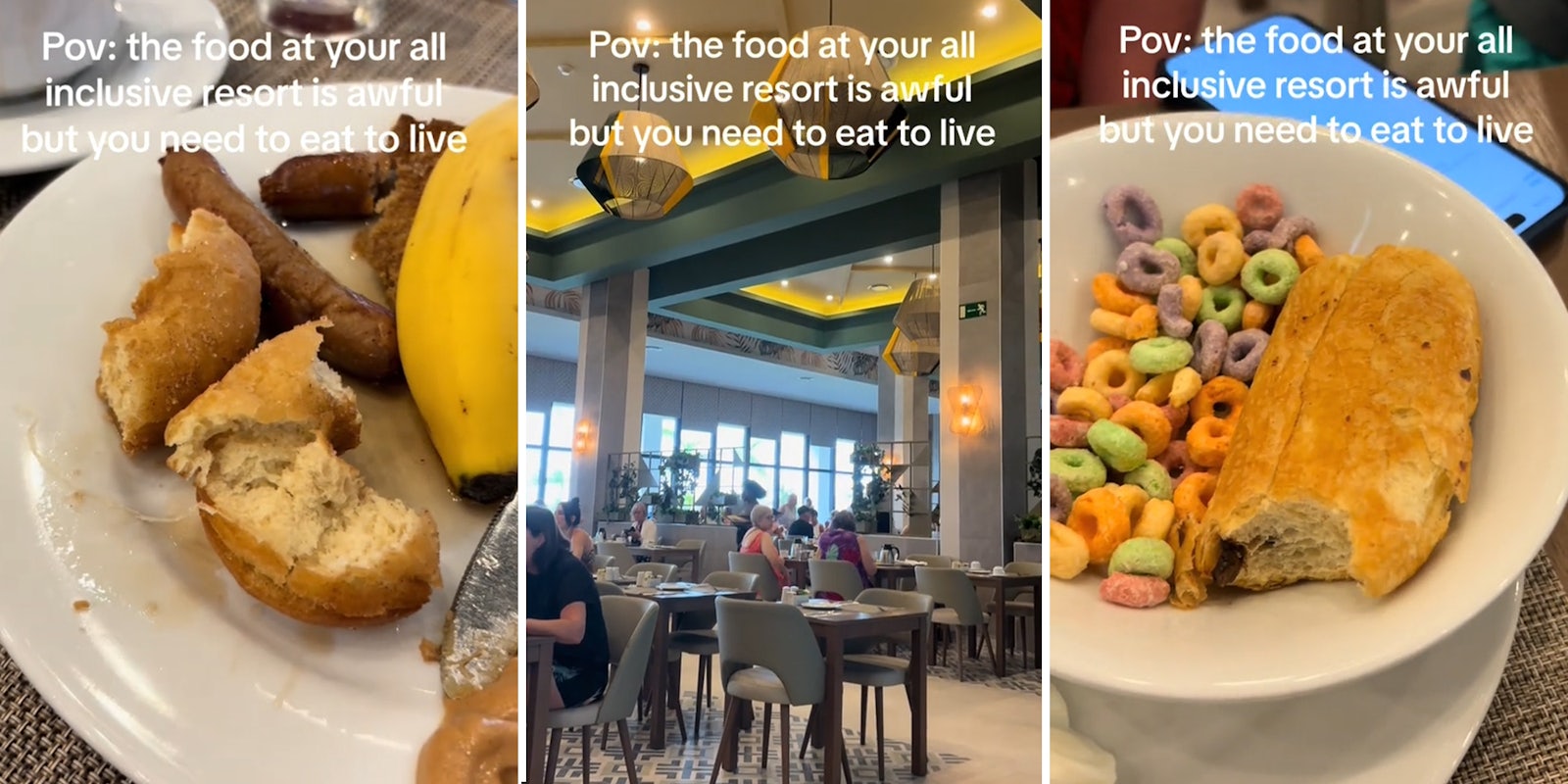In a viral TikTok clip that has quickly caught the attention of over 2.9 million viewers, Becca (@beccamamane) shares a candid glimpse into her dining experience at an Hotel RIU all-inclusive resort in Mexico. With a straightforward overlay text, “POV: the food at your all-inclusive resort is awful, but you need to eat to live,” Becca sets the stage for what many travelers fear when booking their vacation packages.
The video, captured at a Hotel RIU in an unspecified beach town, showcases a series of disappointing meal options, including a dry donut, an equally dry sausage, and an unappealing sandwich, starkly illustrating the potential pitfalls of all-inclusive dining.
Adding to the lackluster spread, Becca displays a bowl of dry Fruit Loops and an unidentified pastry, further emphasizing the dismal culinary offerings. The video has sparked a conversation in the comments section, with viewers expressing concern over their upcoming vacations, particularly those headed to, or had been to, Punta Cana—in the Dominican Republic—worried they might encounter similar food woes.
An apprehensive person wrote, “Oh no, I’m’ going to the new Secrets Punta Cana, and now I’m stressed lol.”
“I legit was fighting for my life in Punta Cana,” said one person who had already been to the beach resort. “Punta Cana was the worst!!!” said another person. “Lived on bread and coffee for seven days.”
One person wrote, “Literally the nicest resorts money can buy in Punta Cana will serve stuff like corn pizza. It’s insane.”
“The best thing about Punta Cana was eating at the Wendys in the airport after five days of awful resort food at the Riu,” said another commenter. Some claimed to have no issues with Punta Cunta, with one writing, “Been to Punta Cana 6 times, never had an issue with food.”
A major tourist destination in the Dominican Republic, Punta Cana faced heightened safety concerns following several American tourist deaths in 2019. Despite the alarming headlines, an examination of the facts suggests these incidents were within the expected range given the area’s high visitor numbers, with over 2 million annual tourists. The FBI’s involvement and subsequent findings of no foul play further support Punta Cana’s safety.
The Dominican Republic’s tourism ministry and the U.S. State Department have echoed this sentiment, attributing the deaths to natural causes like heart attacks and pneumonia. The response included the Hard Rock Hotel in Punta Cana removing liquor dispensers from rooms and enhancing health clinic standards. This situation sparked a debate on the ethics of tourism in developing nations and highlighted the importance of safety protocols and respectful travel practices. Despite initial concerns, Punta Cana’s commitment to visitor safety, through initiatives like the Punta Cana Promise, aims to maintain its status as a secure and appealing destination for international travelers, balancing tourist satisfaction with the well-being of local communities.
Moreover, the ethical implications of using third-world countries as playgrounds are at play. A 2015 European Tourism Futures Institute (ETFI) study explores the impact of all-inclusive establishments on local communities, focusing on economic, sociocultural, and environmental aspects. Economically, such resorts often harm local economies by leading to the closure of local shops and restaurants, offering low wages to local employees, and not reinvesting profits into the regional economy. Regarding sociocultural impacts, while all-inclusive resorts provide employment, locals typically receive lower-quality jobs than expatriates and face increased living costs. Additionally, these resorts can restrict local access to natural resources and contribute to social tensions. Environmentally, all-inclusives generate more waste and demand for resources than local populations, potentially harming ecological systems and destroying natural habitats.
So in many contexts, the idea that a person isn’t getting top-shelf cuisine may be the least of the issues at hand.
@beccamamane One bite everyone knows the rules! #travel #allinclusive #buffet ##breakfast ♬ original sound – 💔Antisocial💔
Despite the food, it does appear Becca and her friends had an amazing time in Mexico.
The clip serves as a lighthearted yet poignant reminder that while all-inclusive resorts in destinations like Punta Cana offer the allure of convenience and unlimited amenities, the quality of food can vary greatly, potentially impacting the overall vacation experience.
The Daily Dot contacted Becca and Hotel RUI for comment.


